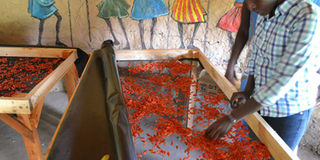The newest cash cow in dry West Pokot

A lady works on the harvested chili on a sieve at a community collection centre in West Pokot. Farmers in the region have been contracted for supply of the commodity by La Fattoria Limited, a Malindi-based Italian company, which exports the horticultural produce. PHOTO | ISAIAH ESIPISU | NATION MEDIA GROUP
What you need to know:
- Once irrigated in the initial stage, chilli can survive even the toughest climatic conditions.
- Chilli is one of the best performing crops in this area because it is drought-tolerant, and does not need top dressing with fertilisers or watering once the roots are well-developed.
- La Fattoria provides the former pastoralists with certified chilli seeds to ensure farmers plant the recommended variety and quality is maintained, says Glenda Andiema, the company’s marketing executive.
- Early adopters of the project have already harvested their crop, and delivered it to a community drying centre before the buyer collected it.
On a shiny afternoon in Kangorio village in the heart of West Pokot County, Cheila Cherop and her husband Richard Longiro are busy laying drip irrigation pipes on their quarter acre.
The two are preparing to transplant chilli plants from a nursery they prepared three weeks ago.
In about four months, the Longiros would be harvesting the produce.
“The crop matures in three months but you wait for two to three weeks, thereafter, for it to ripen,” says Longiro.
The couple is among 200 households in West Pokot contracted by La Fattoria Limited, a Malindi-based Italian company, which exports the horticultural produce.
Each of the farmers grow the African bird’s eye chilli variety considered extremely hot, and on high demand in the Italian market, on a minimum of a quarter acre.
They then supply the company with dried harvest at Sh200 a kilo.
A quarter acre holds up to 2,500 chilli plants, and if well taken care of, a plant yields up to 1.5kg in three years, according to Giuseppe De Bac, an agronomist and the Food and Agriculture Organisation Project Manager in West Pokot.
This translates to 3,750kg in three years, which potentially earns the farmer some Sh750,000 in the same period or Sh250,000 per year as per the contract.
“Chilli is one of the best performing crops in this area because it is drought-tolerant, and does not need top dressing with fertilisers or watering once the roots are well-developed,” says De Bac.
However, the initial investment is quite expensive. But for the 200 farmers in West Pokot, FAO has donated water storage tanks, and drip irrigation kits hoping that later, they will have enough income to purchase more kits and increase the acreages.
FOLLOW GOOD AGRONOMICAL PRACTICES
“Without irrigation, this crop may not survive the initial stage of root development, which takes about three months,” says De Bac, adding they are also working with Italian Agency for Development Cooperation in the venture.

Pamela Chepkorir checks her chili crops in her farm in West Pokot. La Fattoria provides the former pastoralists with certified chilli seeds to ensure farmers plant the recommended variety and quality is maintained. PHOTO | ISAIAH ESIPISU | NATION MEDIA GROUP
But once irrigated during the initial stage, the crop can survive even the toughest climatic conditions and remain highly productive for three years.
La Fattoria provides the former pastoralists with certified chilli seeds to ensure farmers plant the recommended variety and quality is maintained, says Glenda Andiema, the company’s marketing executive.
The West Pokot County Government has taken keen interest in the project, where it provides agricultural extension officers who work together with FAO, and agronomists from La Fattoria Limited to ensure that farmers follow the agronomic practices the have learnt since 2016.
“This venture is positive for the community as we have always relied on livestock as the key source of livelihood. Any alternative means of income generation is welcome,” says Haron Kibet, Masol Ward County Administrator.
Early adopters of the project have already harvested their crop, and delivered it to a community drying centre before the buyer collected it.
Anne Mbaabu, the Director for Market Access programme at the Alliance for Green Revolution in Africa (AGRA), notes that contract farming for smallholder farmers growing such crops works well in groups as the buyer is able to get the quantity he needs.
“However, there must be trust between the supplier and the buyer. And the buyers must ensure that they de-risk the farmers from poor yields by ensuring that good agronomical practices are followed and by linking them to insurance service providers to cushion them whenever there is climatic catastrophe,” she says.





